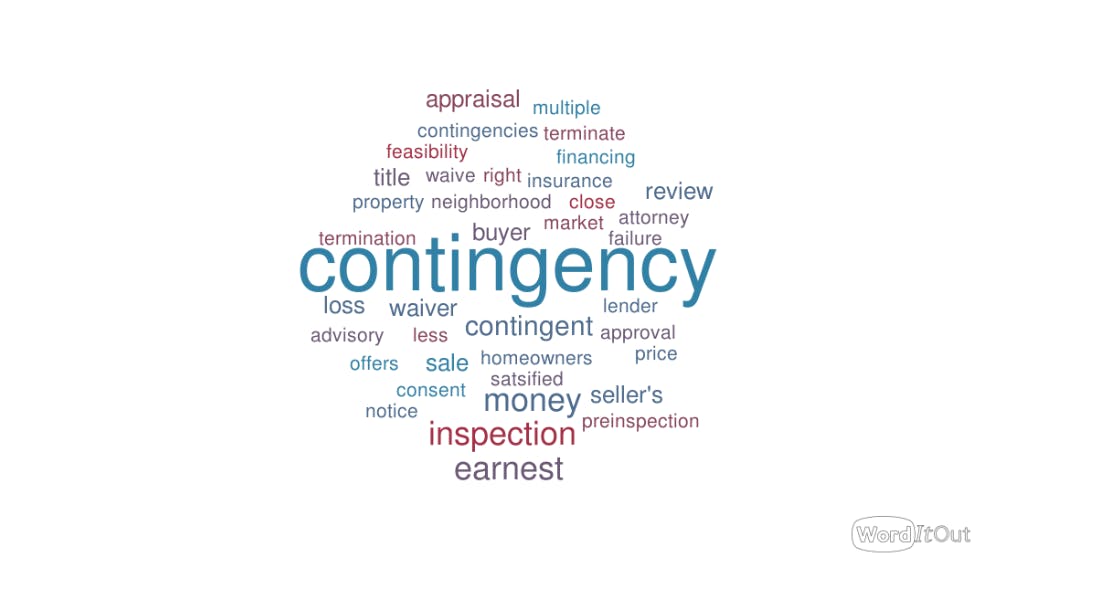You’ve narrowed your search to one or two homes and are starting to think about making an offer. Before you do, it’s wise to first think about what’s most important to you about the full purchase agreement.
What matters most to you? Would you be upset to learn six months after moving in that the home may have had termite damage for years? Would you mind if you found out after getting the keys to your new home that there’s a noisy nightclub within earshot and affecting your ability to sleep?
Some people say they can fix issues or learn to live with them – and others cannot. Welcome to the world of conditional clauses – better known as contingencies – which are legally binding when certain conditions are met. Think about how you – the buyer – want to protect yourself from unexpected developments that could make it difficult to be released from the contract.
While still searching for the right home, we strongly recommend you discuss a strategy with your real estate professional and, possibly, a real estate attorney over the number and type of contingency clauses to include in the offer. Prioritize those conditional terms as you also consider the impact of waiving others.
The most common condition to safeguard against is a financing contingency, which asks the seller to accept the offer and to take the property off the market while the buyer attempts to obtain funds (most often a mortgage) to meet the agreed price. If the buyer is unable to obtain financing after a good-faith effort and with documented proof from the lender, the buyer can generally terminate the offer and have the earnest money refunded.
Other contingencies include: the sale of the buyer’s current property, particularly when funds from the sale would be used to help pay for the new home; the satisfactory completion of a home inspection(s); time for attorney contract review or examination of an Homeowners Association budget and rules; and, the ability to obtain homeowner’s insurance.
In a nutshell, contingencies provide safeguards in the escrow process. Each contingency is an opportunity to negotiate credits or repairs from the seller.
If the purchase offer contains a contingency clause, it would be enforceable assuming that contingent event occurs. And if it does not, the contract is usually terminated and earnest money returned to the buyer.
Your real estate broker and attorney are responsible for ensuring the contingency clause is clearly articulated. For example, an inspection clause should include who is responsible for ordering and paying for the inspection, when and how the buyer must give the seller notice of disapproval of the inspection report, the seller’s option to perform repairs, offer credit on the sale or terminate the contract, and a time limit for reinspection if the seller makes repairs.
Additional contingencies that could protect the buyer include: reviewing the title and/or zoning laws for easements or other restrictions that affect a buyer’s intended use of the property, or learning that a lender’s appraisal (a seller’s home value) is less than the offer amount and the seller is unwilling to help address the price difference. Buyers can even use a neighborhood contingency – pointing to the condition of schools, the availability of parking, or noise levels (such as nightclubs, if you are aware of them in advance) – to withdraw the offer and recoup the earnest money.
All parties are expected to act in good faith and make a reasonable effort to complete the condition included in a contingency clause. For example, a buyer must prove it has applied within reasonable time for the specific type of loan and with the lender stated on the financing contingency. Any change to that information without seller’s approval would deem the clause waived and no longer valid.
The person benefitting from the contingency usually has the right to waive the clause, such as a buyer dropping an inspection contingency. Some buyers waive inspections in favor of the results from a pre-contract inspection, even though, for example, a separate inspection by a pest specialist did not take place.
Buyer beware: Unless otherwise stated, a buyer waiving the “pending sale of property“ contingency also usually waives all other contingencies in the offer. In this and other cases, a good real estate attorney can generally write stronger contingency language to help protect buyers/clients. (Real estate professionals are limited when drafting contingencies since they cannot directly practice law.)
It’s important to consider the consequences of including several contingencies, particularly in a competitive seller’s market. When including multiple “out clauses” in an offer, a buyer not only risks forfeiting earnest money for failing to follow through on any one of the contingencies, but he/she also possibly faces legal consequences for hindering the ultimate sale of the home.
On the other side of the equation, an offer without contingencies is extremely favorable to sellers and exposes buyers to potential home headaches down the road.
It’s best to discuss with a real estate broker your priorities when contemplating an offer – location, price, home condition, inspection results – and what aspects of the property that can be addressed after move-in. As a trusted advisor, your John L. Scott broker wants you to be informed and aware about the potential rewards and risks.




